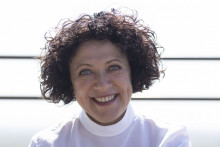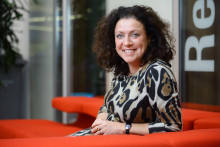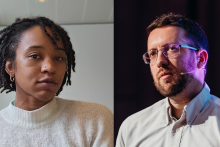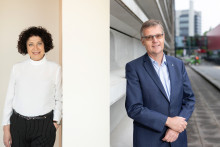You've only been dean of the BMS faculty for nine months. How did you like the start?
'Great. The first two months were very exciting because I felt that there were too many new challenges. After that, it went more steadily. Mainly because I feel lucky to have a strong team around me.’
Before we look at 2023: what kind of year was 2022 for BMS?
'A very good year. We received serious research grants, appointed new full professors, did well in the rankings of study programs, and received good feedback on the Strategy Evaluation Protocol. I feel a lot of energy and ambition in the faculty. Of course, credits for these achievement go to the previous faculty board to a large extent. The year of 2022 saw also a relatively high turnover level among the support staff at the faculty. At one hand, staff mobility is a good development, but on the other, not all vacancies were fulfilled on time. That created extra worries.'
What do you expect that energy and ambition will bring in 2023?
'I used the first few months mainly to listen and get my bearings. Realising all the plans in one year is impossible, but my main aim is to bring about a culture change with more consolidation of structure and people management. This change applies to all of us: we need to change our mindset and move away from our own island of expertise towards team thinking as the whole faculty. To make hidden issues visible and open. To break vicious circles, to make decision-making process more transparent. To bring support and academic processes closer to each other.’
‘I want to see a strong, safe and trusted work climate. For me it means encouraging everyone to speak up and speak out, but to do so with respect for each other’s expertise. My wish is that everyone with leadership responsibilities puts team interests above personal interests and emphasizes development of colleagues and invests in building trust.’
Why is this change needed?
'BMS is a merged faculty and it takes time to establish traditions that go beyond that sum of two previous faculties. I am sure that we can make gains in many areas. I am looking forward to start judging each other’s successes less based on rankings and grades but more on personal development and contribution to the university. We use the word impact far too easily nowadays. Much more important is to answer the questions: why are we doing what we are doing? And what becomes better from our activities? Answers to those questions mean a lot more.'
When it comes to education and research: where do you hope BMS is by the end of 2023?
‘In research, we join two sector plans. SSH (Social Sciences and Humanities) and techniek. We got used to conducting interdisciplinary research, but we don't want to stand still. In the year to come we need to identify our next steps to advance research into an intersection of Social and High Tech sciences. I am looking forward to the new opportunities for the BMS Lab. In education, we want to continue initiatives in designing Humanitarian Engineering program and developing the bachelor IEM, within the VU-UT collaboration. In addition, the BMS Teaching Academy is excelling. We made a good start with that and want to continue with that.’
All UT faculties and departments have difficulties finding staff. How is the situation at BMS?
'With us too, it was not easy to get new colleagues, especially when it comes to support staff. Fortunately, that is going in the right direction now. In my opinion, we can make gains here as UT, by working more together with all faculties. If a job candidate is not suitable for BMS, maybe we can recommend this candidate for another faculty. In the recruitment process, it is vitally important to attract job seekers on the basis of our UT values such as work life balance.’
What else do you hope for in 2023?
'I hope that we can make a good case for the ongoing debate about internationalisation in the higher education. We need to voice that we need international students and staff. Not to increase the enrolment race, but to broaden the diverse and inclusive world to our students and colleagues. We cannot isolate ourselves from the rest of the world. We should welcome international knowledge, skills and traditions for the best of innovation and societal impact.'






